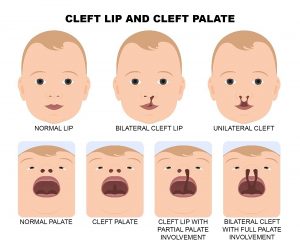Recognizing National Cleft & Craniofacial Awareness & Prevention Month in July
National Cleft & Craniofacial Awareness & Prevention Month (NCCAPM) is observed every July not only to bring awareness to cleft and craniofacial defects but to share available resources for families. According to the Centers for Disease Control and Prevention (CDC), cleft lip and cleft palate are the most common congenital craniofacial anomalies in the United States.
What is craniofacial surgery?
Craniofacial surgery is a surgical subspecialty of plastic surgery that addresses deformities of the head, skull, face, or jaw that are present at birth or develop later on in life. The most common facial abnormalities include cleft lip with or without cleft palate.
What is cleft lip surgery, and what does it involve?
Cleft lip surgery is usually performed between 3 and 6 months of age. The procedure involves the closure of the lip and alveolar (gum ridge) defect. Cleft lip surgery repositions the upper lip and nose, which will allow the child to feed better while also helping to guide the growth of the maxilla, which is the bone that forms the upper jaw.
What is cleft palate surgery, and what does it involve?
Cleft palate surgery is usually performed a little later on in a child’s life, typically around 12 months of age. The timing of the procedure is critical for speech development, as well as improving feeding. Cleft palate surgery involves the closure of the nasal and palatal lining (mucosa) and the repositioning of the levator muscle (the muscle that lifts the palate for speech and swallowing purposes).
Our professional plastic surgeons in New Jersey have completed specialized fellowship training in craniofacial surgery. Dr. Sean Herman is a Plastic and Reconstructive surgeon specializing in cleft, craniofacial, and pediatric plastic surgery at The Institute for Advanced Reconstruction. For more information about our craniofacial program and the additional services that we provide, please fill out a form or contact us directly at (732) 704-4213 to schedule a consultation.
Resources
http://www.nccapm.org/index.html




